

Between April 2021 and March 2023, HEY Smile Foundation led the Humber and North Yorkshire Health and Care Partnership’s Green Social Prescribing ‘test and learn’ programme across all six places of: East Yorkshire; Hull; North Yorkshire; Vale of York; North Lincolnshire; and North East Lincolnshire.
The programme was funded and supported by: the Department for Environment, Food and Rural Affairs; NHS England; Office for Health Improvement & Disparities; National Academy of Social Prescribing; Natural England; Sport England; Department for Levelling Up, Housing & Communities; and Department of Health & Social Care.
Humber and North Yorkshire was one of just seven ‘test and learn’ sites established in England to look at how to increase the use of, and connection with, the outdoors and nature through referral to ‘green’ and ‘blue’ community-based projects and activities, a formed part of the national £5.77m cross-governmental, ‘Preventing and tackling mental ill health through green social prescribing’ project.
This national programme built on the government’s commitment to transform mental health services and increase social prescribing, as set out in the NHS Long Term Plan. It also sought to deliver on the ambition set out in the government’s 25 Year Environment Plan to help more people, from all backgrounds, to engage with and spend time in ‘green’ and ‘blue’ spaces in their everyday lives.
A final report on the programme can be read here alongside an accompanying report from the University of York who analysed data collected through the programme’s work to Follow People on their Green Social Prescribing Journey.
A summary of the programme and it’s finding is below.
What is Green Social Prescribing?
Green social prescribing (GSP) is the practice of supporting people to engage in nature-based activities to improve their mental and physical health. Through Social Prescribing Link Workers (and other trusted professionals in allied roles) people are connected to community groups and activities based on a ‘what matters to you’ conversation.
Activities can range from local walking groups, community gardening projects, green gyms, practical nature conservation and arts activities which take place outdoors, and includes both our ‘green’ (outdoors and in nature) and ‘blue’ (on or near water) environments.
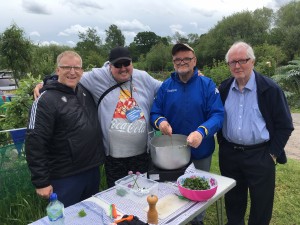
Open Country’s ‘Nature Connections’ allotment group, one of 36 projects funded across Humber and North Yorkshire as part of the Green Social Prescribing ‘test and learn’ programme. Photo credit Open Country.
We know that taking part in activities that occur in the outdoors and nature is good for our health and wellbeing. The National Academy of Social Prescribing’s academic collaborative recently completed a rapid evidence review of the natural environment and health and wellbeing, which is summarised below:
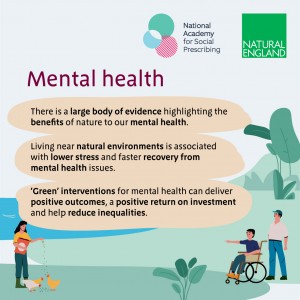
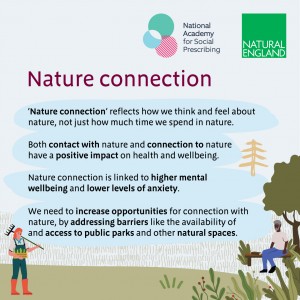
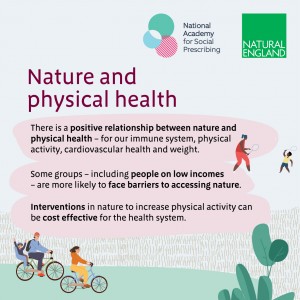
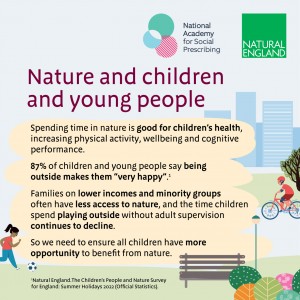
Meanwhile, Natural England’s People & Nature Survey summarised that:
Studies are showing more and more that nature plays a critical role in our physical and mental wellbeing. Our People & Nature Survey data recorded that in January 2022, 90% of adults in England reported they view green and natural spaces as good places for mental health and wellbeing. It’s plain to see that the power of nature is essential for our health, and so Natural England, along with its partners, is on a mission to ensure that more people can access the healing properties of spending time in natural spaces through its green social prescribing programme.
Across the country, there is a clear shift towards acknowledging the benefits that nature and green social prescribing plays in the recovery of mental ill health. That shift is evidenced by reviews such as those outlined within the journal Population Health:
Key findings from the Humber and North Yorkshire Green Social Prescribing ‘test and learn’ programme
The Humber and North Yorkshire (HNY) GSP ‘test and learn’ programme focussed on three areas of work:
- Understanding the Landscape:
Social prescribing services were key to delivering on the programme outcomes and HNY has a rich diversity in delivery models, from those commissioned in the VCSE sector, those led by mental health providers and public health invested approaches. The team connected with different social prescribers across the Partnership to better understand how they delivered their service and any existing connection to outdoor and in-nature activity providers for those accessing social prescribing. 18 providers of social prescribing services were consulted with, representing 29 Primary Care Networks.
How people access the social prescribing service (referral route in), how impact is monitored and evaluated and how information on available VCSE groups for onward referral is stored (including GSP opportunities) was highly variable across the Partnership and offered a range of models of social prescribing delivery to ‘test’ GSP alongside.
Considerable liaison and site-visits were also conducted with the voluntary, community and social enterprise (VCSE) sector to scope out the opportunities across HNY for people to connect with the outdoors and nature. The VCSE sector is always evolving but the infographic below gives a snapshot as to our understanding of the community-based outdoor and in-nature activities across HNY that could link with the aims of the HNY GSP programme.
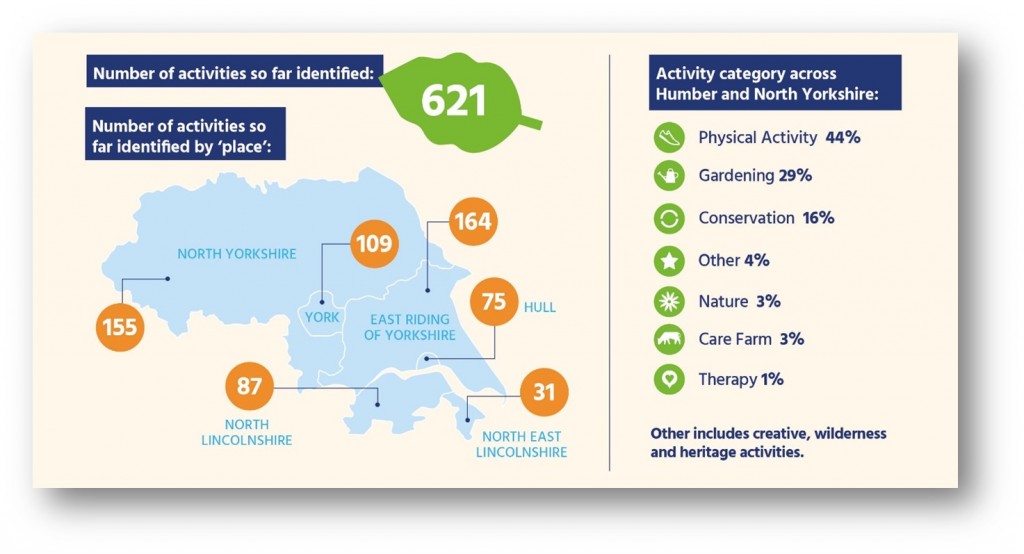
As part of this scoping work the team spoke to over 150 organisations to understand:.
- What activity was being delivered and who were the beneficiaries.
- Existing links to referral routes through social prescribing, mental health or other statutory services.
- How activities were monitored and evaluated.
- Current capacity for more people to access the activity through routes such as referral from social prescribing services.
- How projects were funded.
- Support needs. The main ones highlighted were:
- Access to funding
- Assistance with grant applications
- Formulating links with referral pathways
- Promotion of activities and opportunities
- Support with monitoring and evaluation
- Grow Our Own
A key component of successful bid to secure the GSP ‘test and learn’ investment for HNY was to ‘Grow Our Own’. Investment in to VCSE organisations delivering outdoor and in-nature activity was allocated from the outset, with HNY investing funds through the main programme and through additional funds secured from NHS Charities Together. The groups and organisations funded to deliver activities in their community that utilised the outdoors and nature to support health and wellbeing are shown on the map below:
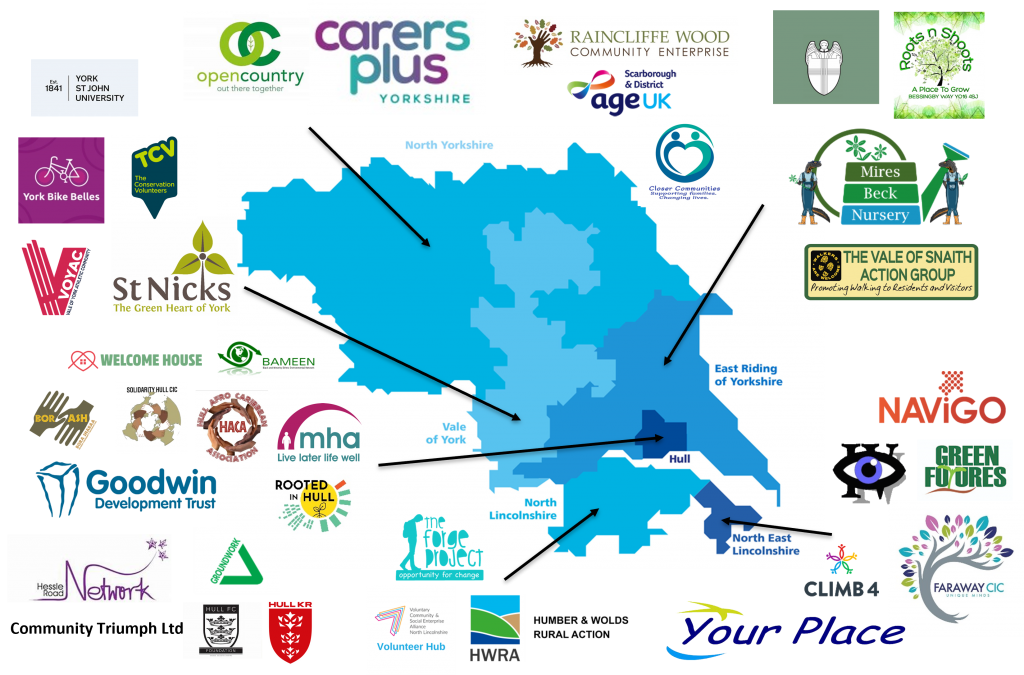
The infographic below summarises how much was invested, the types of activity funded and how many people have taken part so far (many projects are still running).
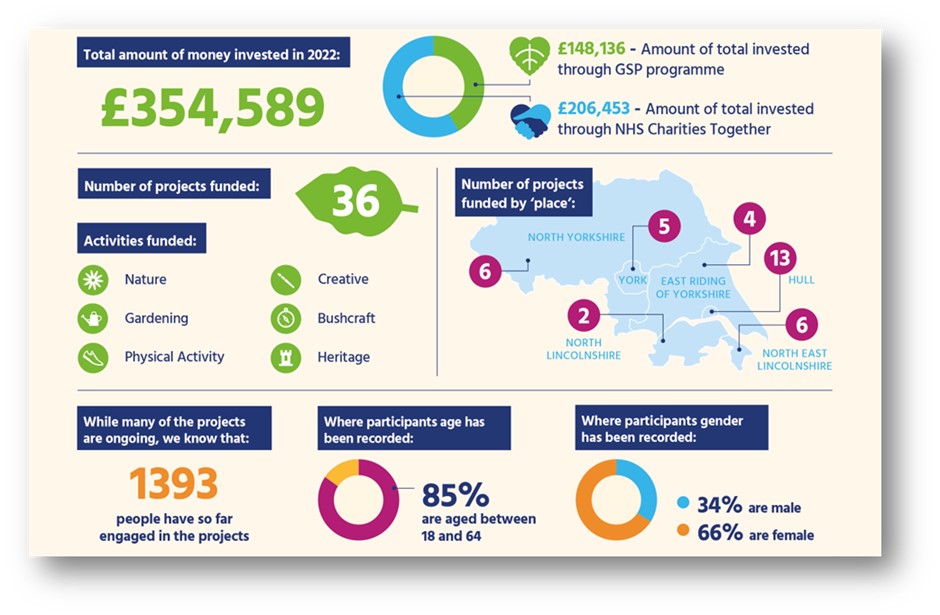
GSP training was also developed, in partnership with Yorkshire Wildlife Trust and Natural England, and has been delivered to 48 social prescribing staff across HNY.
To compliment this training the HNY GSP team have also run three ‘immersive days’ for healthcare staff involved in connecting people to community-based activity in partnership with Natural England and North York Moors National Park.
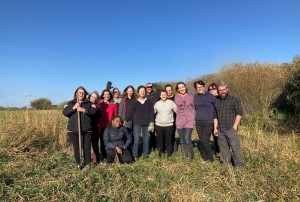
Staff and Patient Experience members from Humber Teaching NHS Foundation Trust at the Lower Derwent Valley National Nature Reserve near York, experiencing an ‘immersive day’ with Natural England. Photo credit Nick Carter.
- Following People on their Green Social Prescribing Journey:
The programme team has worked with social prescribing, mental health and occupational therapy teams across HNY to follow people with mild to moderate mental ill health on their GSP journey, from accessing a service to up to 3 months of GSP activity. £75,309 has been invested into services to support the collection of data to understand:
- How people are referred in to GSP and for what reason.
- Who the people are that take up GSP.
- What activity they choose to do, for how long and how frequently.
- What impact the activity has on their general wellbeing, anxiety, and depression. This was measured using the ONS4 and HADS (Hospital Anxiety and Depression Scale) outcome measures.
The infographic below shows the organisations who have supported this data collection and the summary findings from researchers in the Department of Health Sciences at the University of York who were commissioned to analyse the data collected:
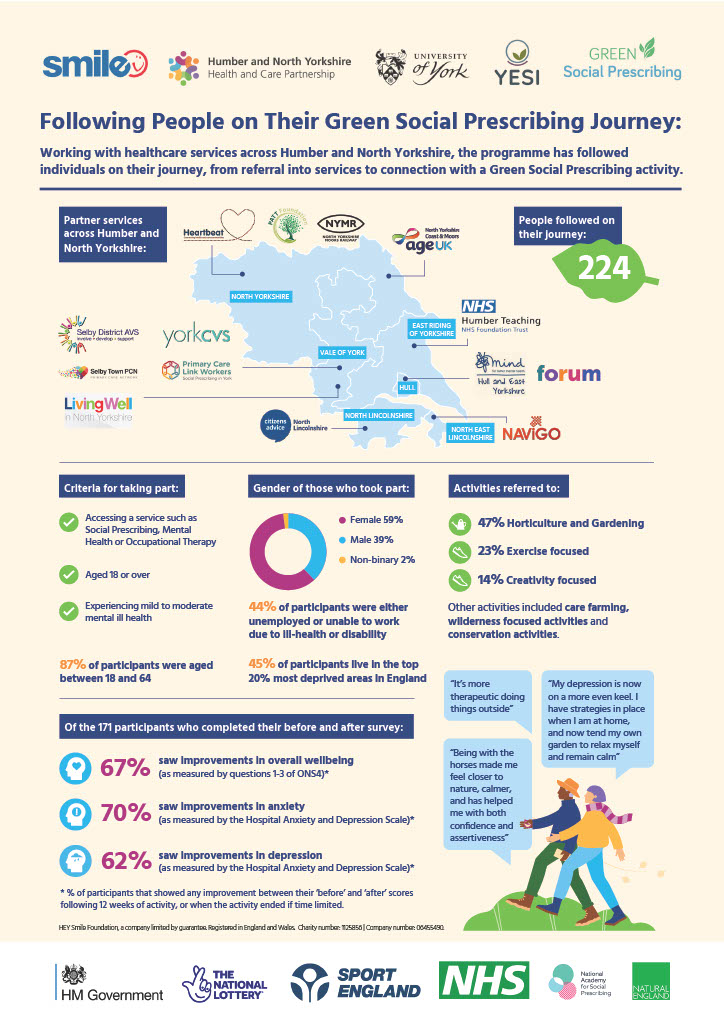
The impact of the HNY GSP ‘test and learn’ programme
Statistical analysis by the University of York of outcome data collected has shown that:
- Taking part in GSP had a significant impact on improving the wellbeing of those taking part, as measured by ONS4, with the largest improvements seen in life satisfaction and living a worthwhile life.
- Taking part in GSP significantly reduced depression and anxiety, as measured by HADS, for those taking part.
- Improvements in anxiety and depression symptoms, as measured by HADS, translated to a medium effect size when reported as a standardised mean difference
- The greatest benefit in wellbeing, anxiety and depression were associated with between five and 12 weeks of GSP activity engagement.
Case studies have also shown the wider impacts of taking part in GSP activity for those living in Humber and North Yorkshire.
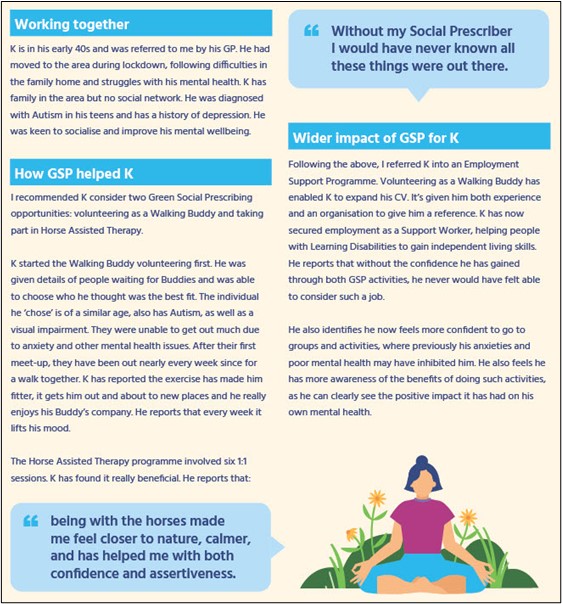
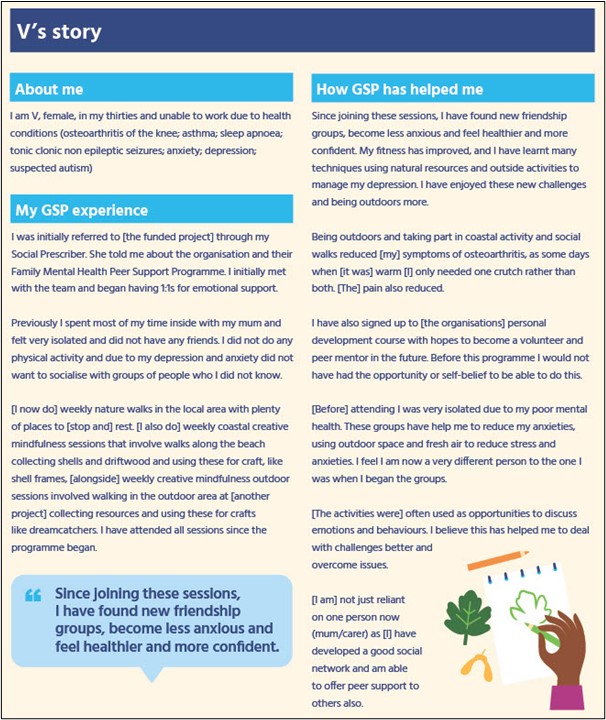
Engaging in GSP activity also supported:
- An increased connection with nature and the outdoors.
- Increased social interaction and connection.
- Building confidence.
- Learning new skills and knowledge.
- Peer-to-Peer support.
- Improvements in physical health.
Recommendations and next steps
Learning from the HNY GSP ‘test and learn’ programme has shown GSP to be an effective tool to support the health and wellbeing of individuals across Humber and North Yorkshire both accessing health and care services, and within communities, to stay fit and healthy.
While the focus has been on mental ill health, the programme’s findings suggest that connecting people with the outdoors and nature could have positive benefits for many different services and priorities across the Partnership, and can play an important role in person-centred, holistic healthcare.
The team recommend the following be invested in to maintain momentum in supporting the health and wellbeing of those that live in HNY by connecting them with the outdoors and nature.
‘Systematise GSP’ to ensure developing referral pathways are consolidated, and the practice of referring into GSP becomes embedded in ‘business as usual’ for services throughout primary care, social prescribing and mental health.
Continued training and development to ensure connection with the outdoors and nature plays a key role in supporting the health and wellbeing of communities and that relevant partners have the knowledge and confidence to both make, and support, referrals.
Sustainable investment into the community sector through developing and piloting shared investment approaches to ensure groups and organisations have the stability and confidence to invest in their workforce and increase the number of activities available that can be easily accessed by different referral pathways.
Build the capacity of providers of outdoor and in-nature activity to be responsive to local healthcare need and demand. There is an opportunity to work with the wider Integrated Care System to identify key cohorts of people that are a challenge to engage with through traditional systems and explore how GSP could be utilised as an alternative approach.
Increasing the evidence base for GSP in Humber and North Yorkshire: The work to follow people on their green social prescribing journey raised lots of questions around potential future work. Following the university’s evaluation, and through discussion amongst the HNY GSP Steering Group membership, it was suggested that future research should seek to identify and evaluate the active ingredient of GSP interventions, allowing for more targeted offers for people with health and wellbeing needs, ensuring the right activity, for the right length of time is available for referring in to. Such work will give a more focussed picture of the efficacy, effectiveness and economical value of GSP that can further support investment in, and commissioning of, community based outdoor and in-nature activity as a valid intervention for mental health and other long-term conditions.
Improved connection and networking: More focussed networks to engage referrers, deliverers and beneficiaries of GSP activity, and the capacity to facilitate this, will help alleviate some of the challenges highlighted in the programme’s findings.
Investment into the above workstreams will allow for further work to be carried out to better understand the opportunities for GSP across the Partnership, including:
- How GSP can help address health inequalities in the longer term. Having demonstrated that GSP is a good way to engage people who are at greatest risk of experiencing health inequalities, longer-term investment and study could explore if GSP could be a route to bringing those long-term unemployed back into work.
- How such activities can support other work programmes and priorities across the HNY Health and Care Partnership.
- How connecting with nature can support staff wellbeing within the NHS and healthcare systems, developing a schedule of activities that could be part of a ‘Wellbeing at Work’ offer.
- How NHS sites and buildings can better use their outdoor space for health and wellbeing activities for staff, patients and services.
- How Personalised Health Budgets can be used to facilitate engagement with green and blue activities and support access to outdoor environments.
A lasting legacy: the work continues
Work still continues as a legacy of the HNY GSP Programme, and through new investment secured to develop and enhance GSP across the region.

Growing Green and Blue Health: HEY Smile Foundation has secured an investment of £247,500 from the Lottery’s Community Fund to continue working in the region to support the development and upskilling of Green and Blue Health opportunities. The project runs until December 2025 and will work closely with the HNY VCSE Collaborative leads to support VCSE groups running outdoor and in-nature activities to develop their offer with regards to health and wellbeing outcomes. This important legacy of the HNY GSP programme will ensure GSP remains at the forefront of the HNY Health and Care Partnership and strengthen the work to connect different sectors to benefit health and wellbeing outcomes for communities.
Using participatory methods with community groups to develop an evaluation to measure the impact of green activities: This is an ongoing piece of work between HEY Smile Foundation and York St John University to co-design a monitoring and evaluation method with six groups funded through NHS Charities Together to deliver GSP activity for their communities, supported with funding from Natural England.
Inspiring Diverse Nature Activities: Through further funding from Natural England, HEY Smile Foundation is working with community leaders to support minority ethnic communities in their desire to get out of their (often urban) communities to experience ‘nature’ and also learn from other projects.
GSP training for healthcare staff and facilitation to organise ‘immersive days’ in partnership with partners for healthcare teams and services. The HNY GSP team is still available to deliver training on GSP to healthcare teams and services across HNY who connect people to community-based activity, including green and blue opportunities, as part of their service. This can be done online or in-person. The team, alongside local Natural England staff, can also facilitate ‘immersive days’ for healthcare teams and services at two National Nature Reserves – the Lower Derwent Valley NNR and the Humberhead Peatlands NNR.
Connectivity and Networking: Through the transition to the Growing Green and Blue Health work, HEY Smile Foundation, with support from the HNY VCSE Collaborative, will still be there to network across the Partnership to promote and advise on GSP. The HNY GSP Steering Group has also made a commitment in retaining their connection to continue to meet to discuss progress, challenges and opportunities regarding GSP across the Partnership.
The HNY GSP programme also supported North Yorkshire Sport, Scarborough Borough Council, North Yorkshire County Council, The Woodsmith Foundation and others to secure investment for the North Yorkshire Coast to become part of The Outdoors Partnership, whose vision is ‘enhancing people’s lives through outdoor activity’. The Outdoor Partnership brings public, private and third sector organisations together to work effectively in the outdoor sector with a common vision. This funding is secured through to 2026.
National Green Social Prescribing programme team support: The national GSP programme team will still be working at a national level to support with GSP, primarily through: strategic leadership and governance: tools and resources; delivery support; and evidence gathering and sharing.
Get involved:
If you want to know more about the Growing Green and Blue Health and how you can be involved please contact Anthony Hurd, Programme Manager.
To view the most recent edition of the Humber and North Yorkshire Green Social Prescribing Newsletter please click below. You can also subscribe on this link, and view previous newsletters:
Green Social Prescribing Programme Newsletter – Edition 21
